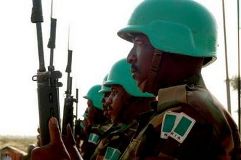Sudan says AU can stay in Darfur but not under UN
Sept 4, 2006 (KHARTOUM) — Sudan will allow African Union troops to remain in its turbulent Darfur region but only if their AU mandate was extended beyond September 30 and not as part of a U.N. force, a presidential advisor said on Monday.
 Sudan raised alarms that its turbulent west could descend into full-blown war after a Foreign Ministry spokesman said on Sunday AU troops monitoring a shaky ceasefire must leave when their mandate expired. The spokesman called the decision final.
Sudan raised alarms that its turbulent west could descend into full-blown war after a Foreign Ministry spokesman said on Sunday AU troops monitoring a shaky ceasefire must leave when their mandate expired. The spokesman called the decision final.
Presidential Advisor Mustafa Osman Ismail said the government was responding to the AU’s stated position that it could not sustain its 7,000 troops in Darfur beyond its mandate.
“The AU has refused to extend its mandate beyond September 30. If they don’t want to extend their mandate, they have to go,” he said.
One African diplomat said the government softened its position overnight because they realized expelling the AU would end all implementation of an AU-brokered May peace deal.
“I am sure the Foreign Ministry spokesman and others were not talking from the tops of their heads yesterday,” the diplomat said.
A U.S-British backed U.N. resolution passed on Thursday, which Khartoum rejects, said more than 20,000 U.N. troops would take over peacekeeping from AU forces who have been unable to end the violence that has ravaged Darfur for 3 1/2 years.
AU troops were expected to fill the gap before the arrival of the U.N. and ultimately be absorbed into the U.N. operation according to the resolution.
Ismail said the government rejected that transition and argued the U.N. mandate’s goal was “regime change.”
“Sudan will not accept those troops to be transformed into part of a U.N. force,” he said.
“Monitoring the borders … protection of civilians … creating an independent judiciary has all become the responsibility of the international forces, so what is left for the government?” he said, referring to clauses in the U.N. resolution.
“The United States has a clear strategy … of trying to weaken this government … or trying to change the government,” Ismail told reporters.
EX REBELS DISAGREE
Washington calls the rape, pillage and murder that has forced 2.5 million from their homes in Darfur genocide and blames the government and its allied militia known locally as Janjaweed.
Khartoum rejects the charge but the International Criminal Court (ICC) is investigating alleged war crimes in Darfur, where tens of thousands of people have been killed.
Critics say Khartoum fears U.N. troops would be used to arrest officials likely to be indicted by the ICC.
Aid workers and security analysts say the violence has escalated since the peace deal signed in May by one of three negotiating rebel factions.
Former rebels who are now part of government with the dominant National Congress Party said they did not agree with the decision to ask the AU to leave.
“It is endangering the Darfur peace agreement and endangering Sudan’s relations with the African and the international community,” said Yasser Arman, spokesman for the Sudan People’s Liberation Movement (SPLM).
He said there had been no consultation on the decision with the partners in government such as the SPLM and the former Darfur rebel Sudan Liberation Movement (SLM), which recently joined government after the May deal.
“The SPLM does not want a confrontation with the international community,” he added.
Local papers quoted SLM leader Minni Arcua Minnawi as calling the decision “a violation of the Darfur peace deal.” The African Union said they still had no official notification of the decision taken Sunday night.
Minnawi was part of a group of mostly non-Arab rebels who took up arms in early 2003 accusing central government of marginalizing arid Darfur.
The EU’s executive Commission called on Sudan on Monday to recognize the broad international consensus for the AU to hand over to a stronger U.N. mission, citing the deteriorating humanitarian situation in Darfur.
(Reuters)
